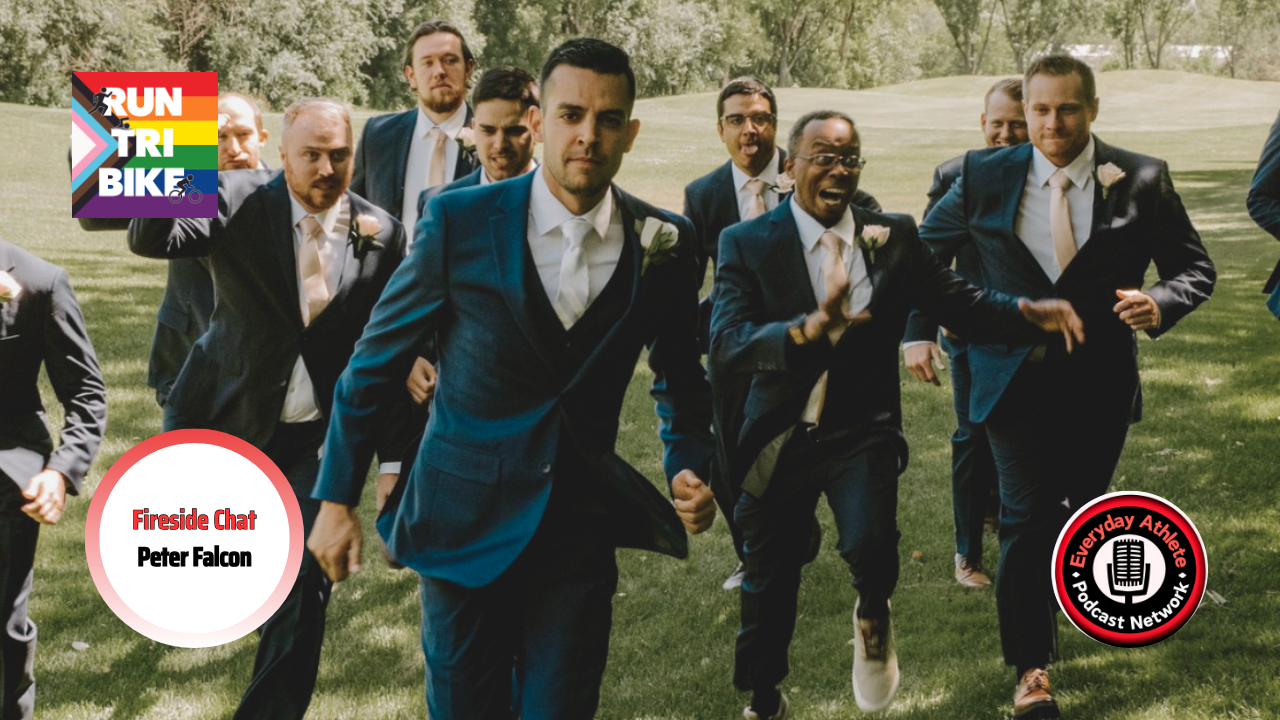The Mind Behind the Miles: Fireside Lessons from Peter Falcon

Running isn’t just about putting one foot in front of the other. It’s about the stories, emotions, and mental strength that drive us to lace up our shoes day after day. In the latest episode of Fireside Chat, host Jason Bahamundi of Run Tri Bike sits down with Peter Falcon, an athletic counselor and mental health therapist, to talk about the often-overlooked connection between mental health and sports, specifically, athletic performance.
Their conversation reminds us that endurance sports are as much about what happens between our ears as they are about what happens on the race course. Whether you’re preparing for your first 5K or another crack at 26.2, this episode offers the mindset shifts and reminders that help us keep running toward a better version of ourselves.
Training the Brain Like a Muscle
Peter opens the conversation by drawing a simple but powerful parallel — the brain is a muscle. Just as we train our legs to run farther or faster, our minds need consistent practice to handle pressure, anxiety, and doubt.
He emphasizes that mental preparation is not a luxury, it’s part of the training plan. Techniques like visualization, mindfulness, and intentional breathing help athletes prepare for the unexpected. Peter reminds listeners that the goal isn’t to eliminate nerves but to understand and redirect them.
Jason echoes this sentiment, noting that endurance athletes often spend hours perfecting their nutrition and pacing plans while overlooking the most crucial tool they carry—their mindset. The takeaway? Practice mental skills the same way you train physically. Your brain deserves reps, too.
Racing Season Rollercoaster: Keeping Perspective
With the fall marathon season approaching, Chicago, and New York City among them, the conversation turns toward the emotional highs and lows that come with racing. Months of preparation lead to one day of execution, and it’s easy for athletes to feel pressure to perform perfectly.
Peter encourages athletes to focus on process goals instead of outcome goals. Instead of obsessing over PRs, he suggests concentrating on pacing discipline, nutrition timing, and staying mentally present. When we anchor our goals to behaviors we can control, we reclaim our power and reduce anxiety.
As Jason puts it, “Sometimes the best race is the one where you have fun and remember why you love this sport.” A timely reminder that running should add joy to your life—not drain it.
Injury, Recovery, and Resilience
Every athlete eventually faces injury. Whether it’s a nagging calf strain or a full-blown stress fracture, recovery isn’t just a physical process, it’s a mental marathon.
Peter shares strategies for reframing setbacks. “You can’t control the injury,” he explains, “but you can control how you respond to it.” He encourages patience, self-compassion, and celebrating the small wins like walking without pain or hitting a new PT milestone.
Jason and Peter agree that recovery is an opportunity to reflect, reset, and rebuild stronger than before. It’s not lost time…it’s part of the endurance journey. For anyone sidelined right now, this part of the conversation feels like a much-needed exhale.
ADVERTISEMENT


Balancing Life, Work, and Training
One of the most relatable parts of the conversation comes when Jason and Peter discuss the juggle of real life. Many endurance athletes are not full-time professionals. They are parents, partners, and employees trying to squeeze in miles between meetings, carpools, and dinner prep.
Peter emphasizes that balance doesn’t mean equal parts, it means intentional shifting. Life ebbs and flows, and sometimes running takes center stage. Other times, family or work does. And that’s okay. He reminds listeners that fulfillment comes from adapting to the season of life you’re in, not forcing perfection.
Jason reflects on how important it is to keep perspective: “The finish line will always be there. What matters most is who you become while chasing it.”
Fall Vibes and Finding Joy in the Journey
Before closing out the chat, Jason and Peter lighten things up with talk of pumpkin spice, Halloween candy, and fall race traditions. It’s a reminder that sport doesn’t have to be serious all the time. Having fun, celebrating small victories, and sharing laughs with your running community are what make endurance sports sustainable.
The segment captures the heart of Run Tri Mag—running not just as competition, but as connection. Every conversation around that virtual “fire” reminds listeners that we’re all in this together, learning how to navigate sport and life with grace and humor.
Why You Should Listen
This Fireside Chat isn’t just another talk about training—it’s about what it means to be human in sport. Jason and Peter explore what athletes rarely talk about openly: fear, anxiety, self-doubt, and how those emotions shape our performances.
If you’ve ever questioned whether you belong at the starting line, this episode will remind you that you do. The conversation between Jason Bahamundi and Peter Falcon proves that mental health and athletic excellence are not separate pursuits—they’re partners in the same race.
So grab your headphones, head out for your next run, and tune in to Fireside Chat: The Mind Behind the Miles. Because becoming a stronger athlete starts with becoming a more self-aware one.
ADVERTISEMENT









